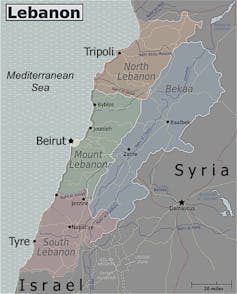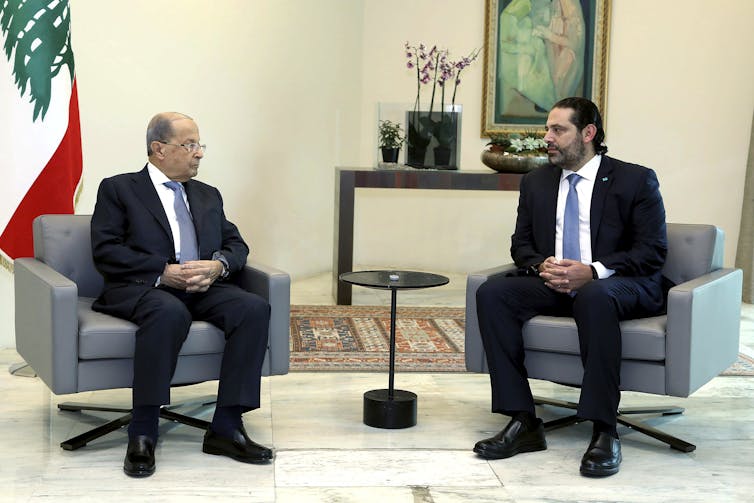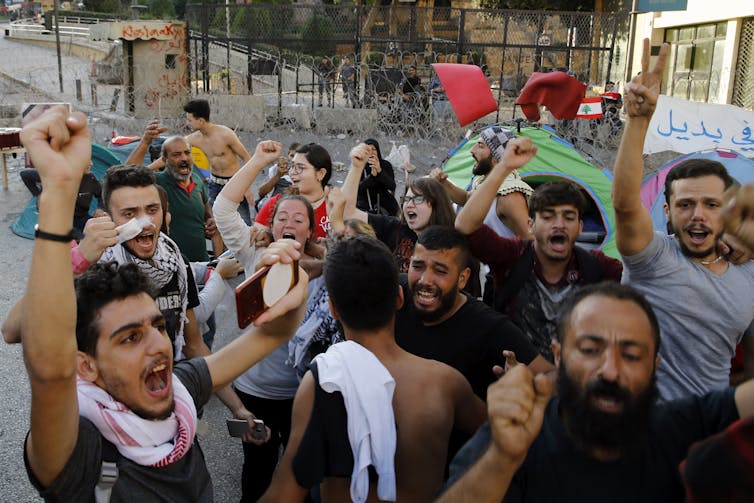Lebanon uprising unites people across faiths, defying deep sectarian divides
- Written by Mira Assaf Kafantaris, Senior Lecturer in English, The Ohio State University
Religion has shaped Lebanon since it gained independence from France in 1943. In this multicultural country[1] of Muslims, Christians and Druze – a medieval faith derived from Islam[2] – religion defines membership and belonging. It is woven into Lebanon’s economic, political and social fabric.
The mass protests[3] that began in mid-October over a proposal to tax WhatsApp calls are challenging that tradition. Over a million Lebanese from all faiths have joined together in these leaderless and nationwide anti-government demonstrations, in which the agenda has now expanded from avoiding taxes to regime change.
“All of them means all of them[4],” protesters nationwide chant, demanding the ouster of Lebanon’s entire ruling class.
On Oct. 29, Lebanese Prime Minister Saad Hariri, a Sunni, resigned[5], elating demonstrators. Protesters blame Hariri, along with Lebanon’s Christian president and Shiite parliament speaker, for rampant corruption, a wrecked economy and a ravaged environment[6].
In repudiation of the idea that religious allegiance[7] comes before national unity, they are demanding[8] fair elections, a stronger judiciary and more government accountability.
 Police remove an anti-government protester blocking a highway in Beirut, Lebanon, Oct. 26, 2019.
AP Photo/Hussein Malla[9]
Police remove an anti-government protester blocking a highway in Beirut, Lebanon, Oct. 26, 2019.
AP Photo/Hussein Malla[9]
‘Hunger has no religion’
With 18 recognized sects – including the Maronite Christians[10]; Sunni, Shiite and Alawite Muslims[11]; and the Druze[12] – Lebanon is one of the most religiously diverse countries in the Middle East.
When a class struggle broke out there in the mid-1970s, it quickly devolved into a civil war[13] between right-wing Christian and left-wing Muslim militias.
To end Lebanon’s conflict, the 1989 Taif Accords[14] required all factions to relinquish their weapons and distributed government positions to politicians of different faiths.
 Lebanon’s administrative divisions reflect its religious divisions, with Shiites concentrated in the country’s south and east and Maronite Christians dominating central areas near Beirut.
Globe-trotter/Perry-Castañeda Library Map Collection - University of Texas Library Online, CC BY-SA[15][16]
Lebanon’s administrative divisions reflect its religious divisions, with Shiites concentrated in the country’s south and east and Maronite Christians dominating central areas near Beirut.
Globe-trotter/Perry-Castañeda Library Map Collection - University of Texas Library Online, CC BY-SA[15][16]
This power-sharing agreement has kept the peace in Lebanon. But it has also given it a political order built on religious factionalism.
Patronage networks run by the “za'eem[17],” as Lebanon’s powerful sectarian leaders are called, protect the interests of their religious communities, doling out favors both legal and illegal. All faiths have their own za'eem.
Religiously based governance has given Lebanon both extreme national debt[18] and staggering inequality. According to the World Inequality Database[19], the richest 1% of Lebanese own approximately a quarter of the nation’s wealth. Lebanon’s infrastructure is crumbling. Power outages[20] are a chronic problem even in urban middle-class neighborhoods.
Widespread human rights violations[21] – including domestic violence[22], child labor[23] and abuse of Syrian refugees – are rarely punished.
But, according to the political scientist Bassel Salloukh[24], Lebanon’s rulers “use sectarian mobilization[25] to camouflage intra-sectarian socioeconomic disparities” – a divide-and-conquer strategy meant to stop class solidarity from emerging.
The beneficiaries of this system argue that Lebanon’s stability hinges on this sectarian balance. And, indeed, sectarianism has been remarkably effective in forestalling dissent for the past 30 years.
It has also instilled a deep distrust in government. A recent poll[26] shows that 96% of Lebanese think political corruption is endemic.
The sectarian construct
As a literary historian[27], I study the stories a nation tells itself about belonging, allegiance and identity. In Lebanon, my home country, I recognize sectarianism as a social construct.
Social constructs, like civility[28] or money[29], are concepts that only mean something because humans agree they do. Often, social constructs benefit the powerful.
By drawing the boundaries of inclusion along religious lines, Lebanese sectarianism has impeded the rise of more unifying ideologies like nationalism or secularism.
“Sectarianism has been depicted as a monolithic force, unchanging in the face of history,” historian Ussama Makdisi[30] wrote in his 2000 book “The Culture of Sectarianism[31]. But, he continues, "sectarianism was produced. Therefore it can be changed.”
Since the civil war, Lebanese have been raised to see religion as the only marker of kinship and rivalry, but the Lebanese share many things: a multilingual literary heritage, for example, and a love of Fairuz[32], one of the Arab world’s most admired singers.
Lebanese of different faiths suffer together, too. As one protester told Foreign Policy, hunger has no religion[33].
 Lebanon’s Prime Minister Saad Hariri, right, with President Michel Aoun before an emergency cabinet meeting, Oct. 21, 2019.
Dalati Nohra via AP[34]
Lebanon’s Prime Minister Saad Hariri, right, with President Michel Aoun before an emergency cabinet meeting, Oct. 21, 2019.
Dalati Nohra via AP[34]
Sectarian politics have been dismantled before. Two decades after Northern Ireland’s Good Friday Agreement[35], the divide between Catholics and Protestants there remains. But it is official government policy[36] to foster peace-building, human rights and religious freedom.
Like protesters in both Tunisia[37] and, more recently, Sudan – who pushed out religiously divisive leaders in hopes of nurturing a more secular democracy – Lebanon’s protests challenge a tired western stereotype that the Middle East is an intolerant, naturally authoritarian place[38].
Hezbollah is no exception
In recent days, demonstrators who support Hezbollah have protested[39] the inclusion of their leader, Hassan Nasrallah, in the movement’s calls for regime change. They say accusations of corruption[40] against this powerful Lebanese political and social force are evidence of a conspiracy by Saudi Arabia, Israel and the United States[41].
Violence erupted[42] on Oct. 29 when Hezbollah supporters attacked demonstrators, re-opening key roads blocked by protester encampments and setting their tents on fire.
Still, the uprising grows. Past violence[43] has failed to quell protests, as have offers[44] from the government to cut lawmakers’ salaries by half and tax banks to relieve national debt.
Prime Minister Hariri’s resignation opens the door for real change in Lebanon, but protests will likely continue. The za'eem system means Hariri’s replacement may well reinforce the same power-sharing model.
 Protesters in Beirut cheer the resignation of Prime Minister Saad Hariri, Oct. 29, 2019.
AP Photo/Bilal Hussein[45]
Protesters in Beirut cheer the resignation of Prime Minister Saad Hariri, Oct. 29, 2019.
AP Photo/Bilal Hussein[45]
The current grassroots protests build on the momentum of a 2015 uprising called the #YouStink movement[46]. Those protests began when Lebanon’s main landfill was shut down and mounds of trash[47] filled the streets of Beirut, but they came to embody numerous other causes: Children[48] marched for climate action. Feminists[49] defended the rights of domestic workers.
In 2018, women ran for office in Lebanon record numbers[50].
Rebuilding a nation
There is an academic theory I like about how nations are built, called “cultural intimacy.”
It holds that communal acts[51] like breaking bread together, say, or self-deprecating humor play a crucial role in creating a shared citizenry.
The 1.5 million Lebanese Sunnis, Shias and Christians who have for weeks been walking side by side, holding hands and raging against the system are not merely protesting. They’re building a society that works for them.
[ Deep knowledge, daily. Sign up for The Conversation’s newsletter[52]. ]
References
- ^ multicultural country (theconversation.com)
- ^ medieval faith derived from Islam (theconversation.com)
- ^ mass protests (edition.cnn.com)
- ^ All of them means all of them (www.independent.co.uk)
- ^ resigned (www.theguardian.com)
- ^ rampant corruption, a wrecked economy and a ravaged environment (www.theguardian.com)
- ^ religious allegiance (www.plutobooks.com)
- ^ are demanding (www.nytimes.com)
- ^ AP Photo/Hussein Malla (www.apimages.com)
- ^ Maronite Christians (news.bbc.co.uk)
- ^ Alawite Muslims (carnegie-mec.org)
- ^ Druze (theconversation.com)
- ^ civil war (www.bbc.com)
- ^ Taif Accords (peacemaker.un.org)
- ^ Globe-trotter/Perry-Castañeda Library Map Collection - University of Texas Library Online (upload.wikimedia.org)
- ^ CC BY-SA (creativecommons.org)
- ^ za'eem (blogs.reuters.com)
- ^ extreme national debt (worldpopulationreview.com)
- ^ World Inequality Database (wid.world)
- ^ Power outages (www.npr.org)
- ^ human rights violations (www.hrw.org)
- ^ domestic violence (www.icj.org)
- ^ child labor (alefliban.org)
- ^ Bassel Salloukh (sas.lau.edu.lb)
- ^ use sectarian mobilization (www.alaraby.co.uk)
- ^ recent poll (www.arabbarometer.org)
- ^ a literary historian (english.osu.edu)
- ^ civility (www.wnycstudios.org)
- ^ money (www.jstor.org)
- ^ Ussama Makdisi (history.rice.edu)
- ^ The Culture of Sectarianism (www.ucpress.edu)
- ^ Fairuz (en.vogue.me)
- ^ hunger has no religion (foreignpolicy.com)
- ^ Dalati Nohra via AP (www.apimages.com)
- ^ Northern Ireland’s Good Friday Agreement (education.niassembly.gov.uk)
- ^ official government policy (theconversation.com)
- ^ Tunisia (blogs.lse.ac.uk)
- ^ Middle East is an intolerant, naturally authoritarian place (www.tandfonline.com)
- ^ have protested (www.npr.org)
- ^ corruption (www.dailystar.com.lb)
- ^ evidence of a conspiracy by Saudi Arabia, Israel and the United States (press.princeton.edu)
- ^ erupted (www.timesofisrael.com)
- ^ violence (foreignpolicy.com)
- ^ offers (www.washingtonpost.com)
- ^ AP Photo/Bilal Hussein (www.apimages.com)
- ^ #YouStink movement (journals.sagepub.com)
- ^ mounds of trash (www.bbc.com)
- ^ Children (journals-sagepub-com.proxy.lib.ohio-state.edu)
- ^ Feminists (www.hrw.org)
- ^ ran for office in Lebanon record numbers (www.unwomen.org)
- ^ communal acts (books.google.com)
- ^ Sign up for The Conversation’s newsletter (theconversation.com)
Authors: Mira Assaf Kafantaris, Senior Lecturer in English, The Ohio State University

